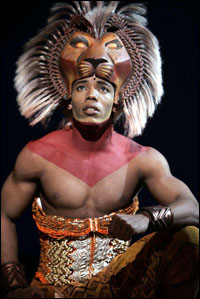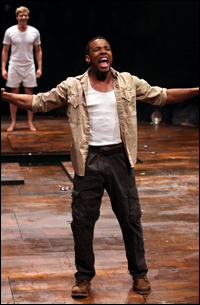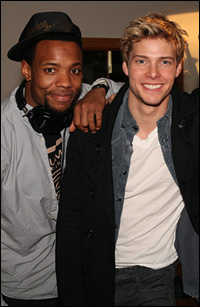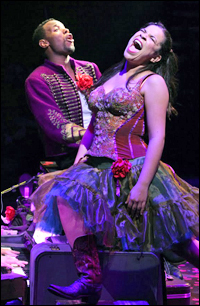
*
Wallace Smith, who was last seen on Broadway "calling out to idiot America" in Green Day's American Idiot, is now calling out to the followers of the Lord — opening the production of Godspell as John the Baptist and gathering the troops with the Stephen Schwartz classic "Prepare Ye." Less than halfway into the show, however, Smith switches hats and takes on the role of Judas Iscariot, a disciple famed for the betrayal of Jesus.
With 11 years of contemporary-Christian songwriting under his belt, Smith explains how religion played a part in his Godspell creative process when faced with the Schwartz material for the first time. Read more about it.
Before Godspell, you came right from American Idiot. Your Broadway credits also include Ragtime, Hair and The Lion King. You've been going from one show to the next.
Wallace Smith: It's been a dream come true. I never expected this journey. It really all started when I began doing Lion King out on the road. After doing the national tour for about three years, they brought me to Broadway in 2007. I did The Lion King for a year from June of 2007 until June of 2008. I never expected to get one Broadway credit, so to get one, I was absolutely satisfied. A year later, they brought Ragtime back and I joined that show. [After Ragtime] I just thought I'd go back to California, which is where I'm from. Santa Monica is my home base.
 |
||
| Smith in The Lion King |
||
| photo by Joan Marcus |
WS: I had an audition like everyone else. I had never done Godspell — not in high school, not in college. This is my first time ever looking at the material. It was the typical audition process. Right before [the audition process] wrapped up, I had a meeting with Stephen Schwartz — of course, I'm tripping over the fact that I'm standing before Stephen Schwartz — and after that [the producers said], "We want you to be a part of this special show." It just happened. We were all thrown into this show and had to get well acquainted with each other and trust each other really fast, which now we do without thinking. Tell me about working with the cast.
WS: For me, it's such a great learning experience because we all bring something to the table that nobody else can bring. Because Godspell is such an ensemble-driven piece, you really are able to see the strengths of each and every person. It's like we're all one body. We depend upon each other so much, and that also carries over outside of work. Our camaraderie goes so far beyond the stage. We really do joke around and play around a lot. It seems cliché to say that we love each other, [but] we were thrown into a situation with so much love, that it just transcended into all of us.
 |
||
| Smith with Hunter Parrish (background) in Godspell. |
||
| photo by Jeremy Daniel |
WS: In my mind, Stephen Schwartz is one of Broadway's all-time greatest composers and writers. When I first met him in the audition process, it kind of felt normal because I would assume that if you wrote the show you would want to be there. [Laughs.] But Stephen has been so hands-on with us — that has been the part that's been so surreal. I can't tell you how nurturing and how wonderful he was to work with during the entire recording session. How did the cast album recording session go?
WS: This is my first cast album. One of my dreams came true because I've always wanted to be a part of an original cast album, and what an album to be a part of because it's really all of our work and all of our voices.
In Godspell you play Judas Iscariot and John the Baptist. Did you have to do any research on these biblical characters or did your own religion play a part in how you approached the show?
WS: I definitely knew a lot about both of the characters because of my religious background, which is Christianity. Being in church my whole life — in my family church was such a big deal — I've heard many stories about John the Baptist, and Judas, of course, everybody knows to be the betrayer. For me, the research that I did was about the facts. With John the Baptist, he was kind of a wild man in the sense that he was very passionate about Jesus coming one day. We really only see John the Baptist for a moment in the show. I tried to capture some of that passion in those couple of moments.
Judas is really what I focused on the most. I knew that when people came to see the show, they were going to be somewhat against him because he's the villain or the betrayer. What I was able to discover, with Danny [Goldstein], my director, was really getting away from "I'm Judas — the villain" and focusing more on his relationship and friendship that he had with Jesus to be one of the disciples. Focusing on that aspect, I was able to find the joy in the show and not play the entire show as an evil menace. I'm sure some people might think that [playing him as the villain would be] the logical thing to do, but in this production of Godspell, we focus on a community of people that have to learn how to really love one another. Judas happens to be the one that needs the most love and forgiveness. I think one of the most beautiful things in this show is that they bring him back into the community even though he feels he's not worthy to be a part of it anymore. I don't think of him as [the enemy]. I think of him as somebody who really wants to do the right thing, but, in all human nature, we all have things we need to work on. [He needs to work on] that particular area of loyalty.
 |
||
| Smith and Hunter Parrish in the recording studio |
||
| photo by Jeremy Daniel |
WS: Danny is probably the most urban director that I've gotten to work with. His knowledge about Godspell, in particular, is so vast. We all look to him to make sure that we have this spirit of Godspell. He really left it to us — and still leaves it to us — to create and to find things. Everything that you see onstage is really our creation. He had very little to do with what we chose to come up with. He celebrated our process so much that we had an atmosphere to create.
When I was talking to George Salazar and Telly Leung, they told me about Danny's concept of "Strong and Wrong."
WS: Yeah, that's been our theme. As an actor, you are able showcase all of your talents in Godspell. Tell me about creating these "bits" throughout the show and making "Strong and Wrong" choices. What is difficult about the process?
WS: I think that's one thing that this production of Godspell does very well — you're really able to see each person, and everybody has their moment. All of those beautiful moments, however, came from this [pile of ideas that] we have backstage called "The Graveyard." In "The Graveyard" are all the bits that we came up with that were terrible. We look at it everyday and we laugh at it because we all had a moment where we tried to create something and everybody [thought], "That's not funny. That's not gonna work." [Laughs.] "The Graveyard" backstage is where we all throw stuff that just didn't make the show — that was strong but definitely wrong. [Laughs.]
What moments of yours that have made it into "The Graveyard"?
WS: I used to have this armpit fart that I would do after Jesus slaps me. I say, "Oh, Jesus Christ!" He comes over and he slaps me and I act like I'm going to punch him — which I still do in the show — but instead of doing the telephone bit that I do now, I used to have this armpit thing where I would put my hand under my arm and do armpit noises. It didn't work because you couldn't hear these armpit sounds once we put on the costumes. That's one of my famous "Graveyard" additions. It was funny in rehearsal! [Laughs.]
 |
||
| Smith and Lindsay Mendez in Godspell. |
||
| photo by Jeremy Daniel |
WS: Yes, indeed. We are there for one another. I never had a moment where I felt like I was just being put out there to feel awkward because we have all laid everything bare. If you work a moment and the moment doesn't work, the next day we come back and figure it out. We do that every day. We check in with each other. That's such a big part, though, of what Godspell demands from its actors. This production really embodies what theatre and the fundamentals of theatre are all about. I've done Lion King where it's a spectacle and [you have] these amazing costumes and these amazing puppets. I've been able to be a part of a ground-breaking show like American Idiot where today's technology was all over the stage and today's music was on the stage, but [Godspell] relies completely on the performer and nothing else. You're a songwriter as well. Can you tell me a little bit about that?
WS: I've been writing songs for 11 years and just recently one of my songs — I write a lot of contemporary-Christian music — got placed on a gospel artist's [album]. His name is Micah Stampley and his album just came out in October. It's called "One Voice" and my song ["Crucified"], that I wrote a couple of years ago, was picked up on it. I'm also working on a solo project while I'm doing Godspell, which will hopefully come out in the spring. It will probably have about five or six songs on it — an EP. I'm really excited about that.
Can you give me a feel for what kind of music is on it?
WS: I would say it's contemporary-Christian. Not every song on there is about Jesus or God, but because some songs [are] — including the song I wrote on Micah Stampley's album — it will probably be along the lines of contemporary-Christian music. It's very, very pop-rock-ish. Some of my friends have heard it, who are not Christians, and they love my music because a lot of the subject matter is very mainstream. I've been really working on trying to produce an album that everybody can listen to in spite of what I believe so that people don't feel excluded. The music industry has to classify it as something, but that doesn't mean that the [material] on there won't be stuff that people can't enjoy.
Have you had any thoughts about writing for a musical?
WS: I've had thoughts about working on a musical — writing it from scratch with maybe a friend or two of mine. It's a scary thing because you look around and you look at all the wonderful musicals that have been written — and are being written — but everybody has to start somewhere. I definitely have thought about it, and it's definitely something I want to look at. It's something that I would really love to do.
Michael Gioia's work frequently appears in the news, feature and video sections of Playbill.com. Write to him at [email protected].
Read Playbill.com's fall Stage to Screens column about "Weeds" star Hunter Parrish, who plays Jesus in Godspell. Check out part three of Godspell's backstage tour:










